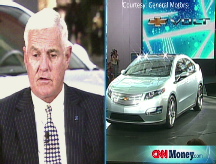Senate's plug-in tax credit has something for all
GM, Chrysler and Toyota all stand to benefit if a tax bill passed this week becomes law.
 |
| Under a Senate bill passed this week, buyers of the 2011 Chevrolet Volt would qualify for a $7,500 tax credit. |
NEW YORK (CNNMoney.com) -- Automakers are giving a big thumbs-up to last-minutes changes in a Senate tax credit bill that would make it easier to buy plug-in electric vehicles.
General Motors said it is "very supportive" of the bill that passed in the Senate yesterday. The measure would give buyers of range-extended plug-ins, like GM's Chevrolet Volt, a tax credit of up $7,500.
A late change to the bill made it an even better deal for Volt buyers, GM said. The Volt is scheduled to go into production in 2010. Pricing for the car will not be announced until close to production time, but it is widely expected to cost close to $40,000.
The tax credit would give GM important pricing flexibility, according to GM spokesman Greg Martin. "We have said this technology is expensive," he said.
Even Toyota, which has objected that an earlier version of the bill had unfairly favored GM's technology, said it is pleased with the final senate bill. Another last-minute alteration bill removed the Japanese carmaker's main objection.
The Senate bill would give buyers a base-line credit of $2,500 for buying a vehicle powered by a 4-kilowatt hour battery. An additional $417 would be added for each KWh of battery power beyond that up to a total limit of $7,500.
The Chevrolet Volt will be powered by a 16 KWh battery which would qualify buyers for the maximum credit. Up until last weekend, the bill had offered just $400 in credits for additional KwH, but that would have left Volt buyers with only a $7,300 credit, a GM tax lobbyist said.
GM lobbied for the additional $17, said spokesman Greg Martin.
"We were supportive of getting the maximum credit out of this vehicle," said Martin, "and I'm sure others will be able to avail themselves of it too."
GM and Toyota are working on two very different types of plug-in vehicles. The bill would also benefit other carmakers, including Chrysler which has just revealed plans for its own plug-in vehicles.
The Volt, as well as two Chrysler prototype vehicles revealed on Tuesday, have gasoline engines that are used only to generate extra electricity for longer trips, sending it to a battery that actually powers the wheels.
In addition to those two vehicles, Chrysler also showed off a plug-in only vehicle with no on-board power generator. Chrysler has committed to producing at least one of the three vehicles in 2010. Others might follow, the carmaker said Tuesday.
The vehicles Chrysler showed, which included an electric Chrysler Town & Country minivan and an electric Jeep Wrangler Unlimited, rely on much more powerful batteries than the Volt's. If the production version are at all similar, the vehicles would easily qaulify for the maximum benefit.
A Chrysler spokeswoman expressed support for the bill.
Toyota is currently developing a plug-in hybrid Prius, but that vehicle would use a battery much smaller than those in the Volt or the Chrysler plug-in vehicles. The Toyota vehicle would probably not be driven purely by electric power, as are the Chrysler and GM vehicles.
A plug-in Prius that Toyota is now testing has an all electric range of about 10 miles. After that it operates like a standard hybrid vehicle. It relies on battery power only at low speeds, during constant-speed cruising and to supplement power from a gas engine.
Other car companies, including Nissan and Mitsubishi, have announced plans to sell plug-in vehicles in the U.S.
Under the Senate bill, buyers of a Prius plug-in would at least qualify for the minimum $2,500 tax credit, said Martha Voss, a Toyota spokeswoman. Previous versions of the bill had used a 9 KwH minimum to qualify for the credit.
Congress still needs to reconcile the Senate bill with a different plug-in tax credit bill passed by the House of Representatives. Neither Toyota nor GM likes the House bill as much. It caps the credit at $5,000 and requires a minimum 5 KwH battery. ![]()


